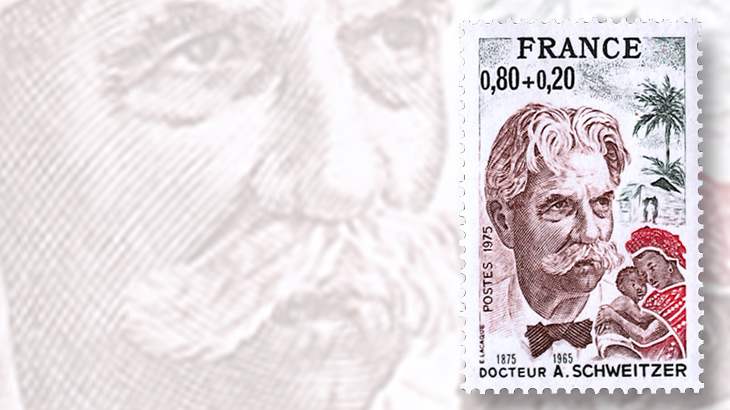World Stamps
Born Jan. 14: Albert Schweitzer

By Michael Baadke
Albert Schweitzer, a medical doctor, philosopher, theologian, musician, and author, was born Jan. 14, 1875, in Kayserberg, Alsace-Lorraine, then part of the German Empire, but later controlled alternately by France and Germany during and between the World Wars. Schweitzer’s birthplace today is in a French department known as Haut-Rhin.
He earned doctorates in philosophy and theology from the University of Strasbourg in 1899 and 1900, respectively, and conducted research while writing his 1906 book, which would be translated into English and published four years later as The Quest of the Historical Jesus. His later theological works included The Mysticism of Paul the Apostle in 1931.
Schweitzer was also an accomplished musician on the organ, and he became a recognized and respected authority on the development and construction of organs. He also wrote a biography of Johann Sebastian Bach that was published in 1905. That same year, he began to study medicine at Strasbourg for the purpose of becoming a medical missionary and devoting his life to assist others.
He earned his medical degree and, with his wife Helene Bresslau Schweitzer, established a hospital in French Equatorial Africa (now Gabon). Today known as the Albert Schweitzer Hospital, it continues to serve the region and conduct important medical research.
Schweitzer developed a philosophy based upon “Reverence for Life,” and his writings on this subject led to his receiving the Nobel Peace Prize in 1953. Schweitzer died at his hospital in Lambarene, Gabon, on Sept. 4, 1965.
He has been honored on many stamps from countries worldwide, including France, Germany, and Gabon.
France issued an 80-centime+20c semipostal stamp honoring Schweitzer in 1975, marking the 100th anniversary of his birth (Scott B483).
MORE RELATED ARTICLES
Headlines
-
US Stamps
Oct 7, 2024, 3 PMMcMurtrie dismissed as APS education director following Sept. 21 arrest
-
US Stamps
Oct 7, 2024, 12 PMVasiliauskas named president of Mystic Stamp Co.
-
US Stamps
Oct 6, 2024, 5 PMApgar souvenir card available
-
US Stamps
Oct 6, 2024, 4 PMFirst Continental Congress and U.N. stamps receive Scott catalog numbers








